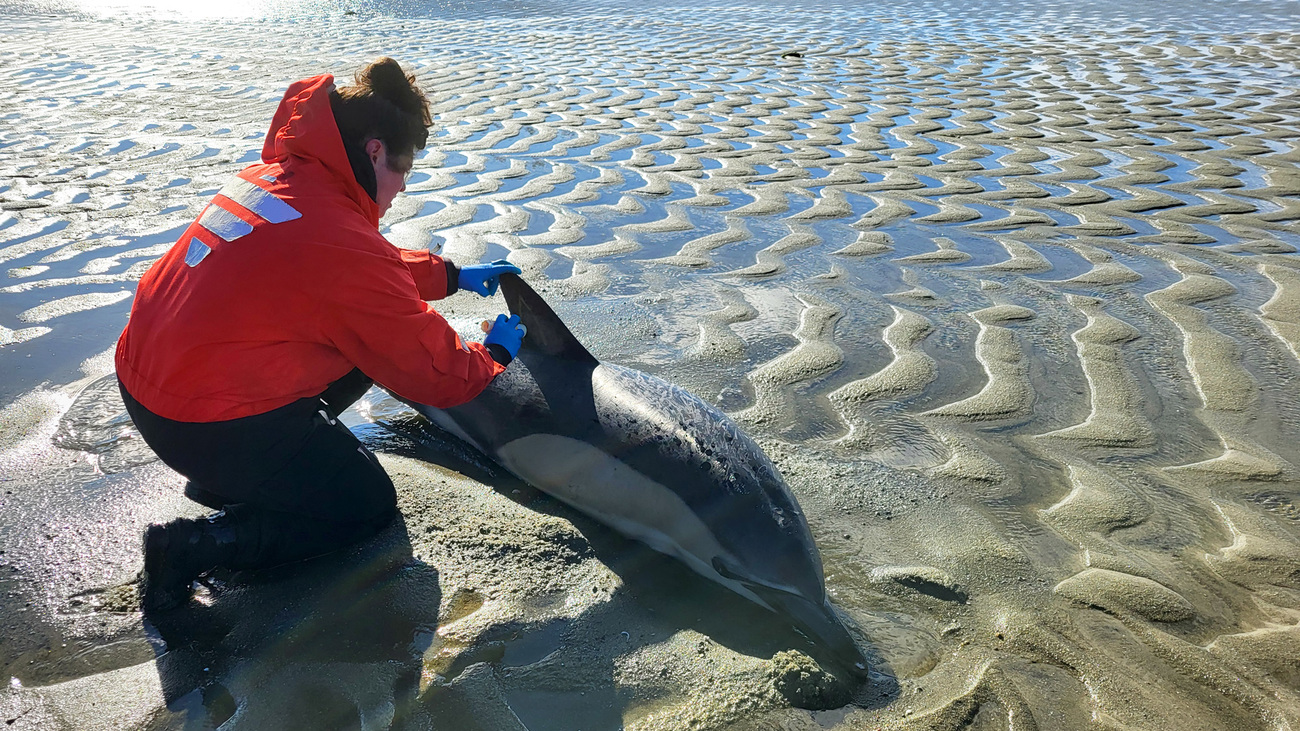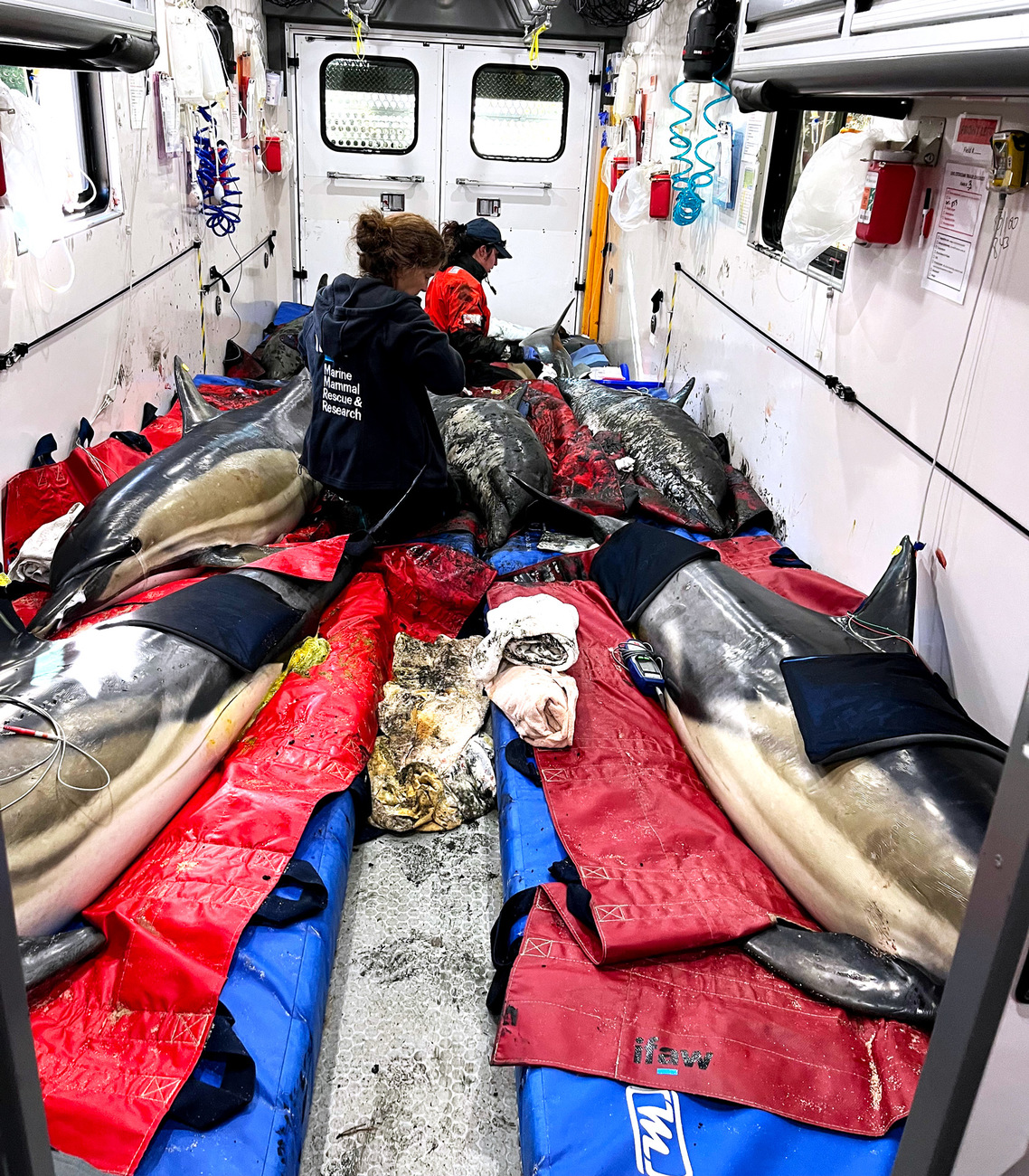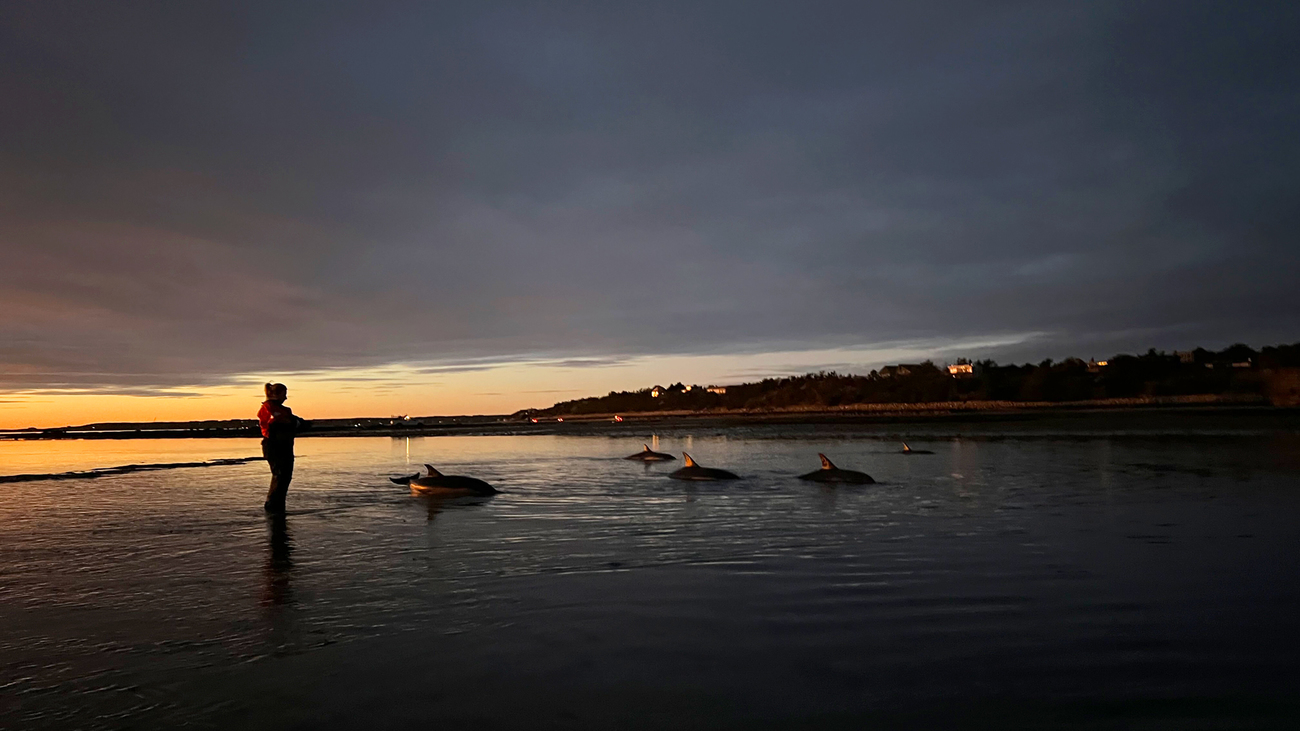Stranded Marine Mammal Rescue - Global
When the tide is low, the stakes are high for marine mammalsSaving dolphins on Cape Cod and sharing rescue expertise worldwide
Saving dolphins on Cape Cod and sharing rescue expertise worldwide
Cape Cod has long been a hotspot for marine mammal strandings, but this past week was one for the record books. IFAW’s marine mammal rescue team faced a staggering series of challenges, responding to an unprecedented number of calls. IFAW’s marine mammal rescue team has now responded to 342 live dolphins thus far in 2024, more than five times our annual average of 67.

An extraordinary week of rescues
Here’s what this past week looked like for our team in numbers:
- 54 dolphins stranded in total across multiple beaches and waterways.
- 46 stranded live; 41 of these were released back to deeper waters to rejoin the ocean.
- On Wednesday, the team marked its 500th response of the year—a testament to the extraordinary demands of 2024.
- In total, 13 animals unfortunately died (six before we arrived, seven after).
Following our response to the largest mass dolphin stranding the US has ever seen, this November, IFAW’s rescue team was once again called to action on Cape Cod. It all began on Saturday, 9 November, with the first call to IFAW’s 24/7 stranding hotline around 6:30 a.m.
By noon that day, we had responded to an estimated 19 common dolphins stranded across eight locations in five different towns on Cape Cod.
Locations included Ellis Landing in Brewster, First Encounter Beach in Eastham, Crowes Pasture in Dennis, the Herring River Gut in Wellfleet, Mayo Beach in Wellfleet, Jeremy Point in Wellfleet, Skaket Beach in Orleans, and Sea Street Beach in Dennis.
A combination of rough winds, cold weather, and a challenging surf made for a complex rescue operation—but the team successfully stabilised and transported 10 dolphins to Herring Cove Beach in Provincetown for release, giving them the greatest chance of survival. At this point, six dolphins had died.
Throughout the week, the calls kept coming. Dolphins stranded on beaches, in marshes, and in narrow tidal zones. Each location presented unique hurdles, from navigating deep mud to racing against the tide. The team’s efforts spanned long days and nights, sometimes requiring innovative solutions like herding dolphins with kayaks or applying satellite tags to monitor their post-rescue movements.
In total, 43 dolphins stranded, with 34 alive. Of those, we were able to release 29 throughout the week, and about 11 refloated with some assistance.
The same week, we also responded to a live minke whale stranded in the surf. This whale died of natural causes, and our team performed a necropsy the next day.
With this flurry of activity, our marine mammal rescue team reached the milestone of responding to 500 animals—dolphins, whales, and seals—total in 2024.

Why do dolphins strand?
Because of Cape Cod’s unique coastline—consisting of sloped sandbars, shallow waters, drastic fluctuations in the tide, and hook-like shape—along with its prime location in dolphin feeding grounds, it is a global hotspot for dolphin strandings. Dolphins in this area often find themselves disoriented after swimming too close to shore at high tide, and they get stuck when the tide goes back out.
Sometimes, dolphins become stranded when they are ill or injured, but there are many other variables that impact healthy dolphins, too—wind speed and direction, significant storms, tides and other oceanographic conditions, and prey and predator distribution. Some human-caused issues can also result in strandings—including ocean noise pollution, entanglements, and vessel strikes.
To add to the challenge, many of these variables are interdependent—they influence one another. It is likely that mass strandings (and individual strandings) happen when a combination of these factors come together.
We believe these dolphins may all have been part of the same pod, but it’s unclear exactly why this group in particular became stranded. Though Cape Cod has always seen more live dolphin strandings than anywhere else in the world, the numbers this year have reached historic highs.
Sharing marine mammal rescue expertise around the world
IFAW has been rescuing marine mammals for more than 27 years, and this year, our team has been busier than ever. Not only have we rescued hundreds of dolphins on Cape Cod—we’ve also been taking our expertise around the globe.

This month, IFAW representatives attended the 25th Biennial Conference on the Biology of Marine Mammals in Perth, Australia. We presented at a workshop for the Global Stranding Network, speaking on strategies and decision-making in mass dolphin strandings.
In March, we facilitated the first marine mammal rescue workshop in Kenya. We invited 40 local participants—fishermen, beach management units, members of dive clubs and community-based organisations, rangers working in Kenya’s marine parks, and officials from the Kenya Marine and Fisheries Research Institute (KMFRI).
This world-class training brought these key players in marine rescue and conservation up to speed on the best practices in the field, highlighting the threats facing marine mammals on the East Africa Coast and teaching techniques for stranding response and disentanglement. For two days, our facilitators brought trainees on the water and on the beach for technical exercises.
In October 2023, IFAW experts deployed to the Amazon Rainforest to help local rescuers save dolphins in a mass stranding that occurred in Lake Téfé. Here, extreme drought conditions and heightened water temperatures caused the stranding of hundreds of endangered Amazon and Tucuxi river dolphins.
We supported local partners with veterinary supplies, field rescue equipment, and other resources needed for the rescue; helped monitor the animals and respond to dolphins in distress; and trained local teams to ensure they are prepared for similar emergencies in the future.
IFAW’s Academy of Rescue and Conservation (ARC) provides training and education in all aspects of animal rescue and wildlife conservation. Requests for our rescue expertise have tripled in some areas due to climate change and other threats. We have marine mammal stranding courses available online and also conduct trainings around the world.
Related content
Our work can’t get done without you. Please give what you can to help animals thrive.